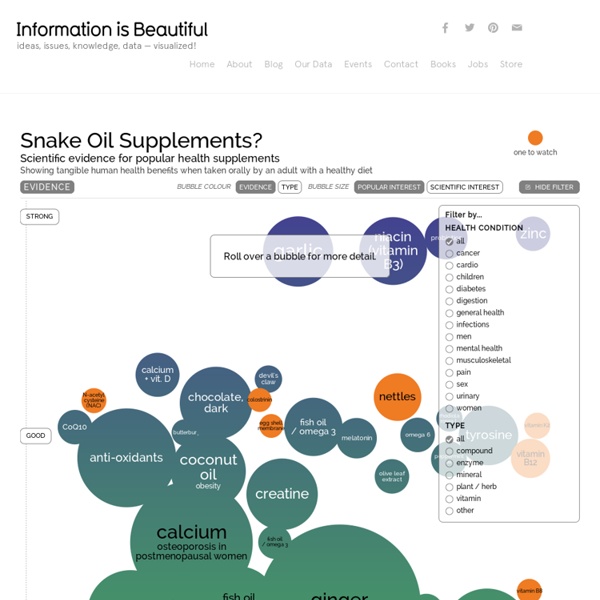



http://www.informationisbeautiful.net/play/snake-oil-supplements/
Related: nutrition • insightEggs' antioxidant properties may help prevent heart disease and cancer, study suggests One of nature's most perfect foods may be even better for us than previously thought. While eggs are well known to be an excellent source of proteins, lipids, vitamins and minerals, researchers at the University of Alberta recently discovered they also contain antioxidant properties, which helps in the prevention of cardiovascular disease and cancer. Jianping Wu, Andreas Schieber and graduate students Chamila Nimalaratne and Daise Lopes-Lutz of the U of A Department of Agricultural Food and Nutritional Science examined egg yolks produced by hens fed typical diets of either primarily wheat or corn.
The Epidemic of Mental Illness: Why? by Marcia Angell The Emperor’s New Drugs: Exploding the Antidepressant Myth by Irving Kirsch Basic Books, 226 pp., $15.99 (paper) Anatomy of an Epidemic: Magic Bullets, Psychiatric Drugs, and the Astonishing Rise of Mental Illness in America
Eight Toxic Foods: A Little Chemical Education Update: You'll notice in this post that I refer to some sites that the original BuzzFeed article I'm complaining out sends people to, often pointing out that these didn't actually support the wilder claims it's making. Well, the folks at BuzzFeed have dealt with this by taking down the links (!) The article now says: "Some studies linked in the original version of this article were concerning unrelated issues. They have been replaced with information directly from the book Rich Food, Poor Food". But as you'll see below, the studies weren't unrelated at all.
Antioxidants in pecans may contribute to heart health and disease prevention A new research study from Loma Linda University (LLU) demonstrates that naturally occurring antioxidants in pecans may help contribute to heart health and disease prevention; the results were published in the January 2011 issue of The Journal of Nutrition. Pecans contain different forms of the antioxidant vitamin E -- known as tocopherols, plus numerous phenolic substances, many of them with antioxidant abilities. The nuts are especially rich in one form of vitamin E called gamma-tocopherols. Why You're Probably Less Popular Than Your Friends Are your friends more popular than you are? There doesn’t seem to be any obvious reason to suppose this is true, but it probably is. We are all more likely to become friends with someone who has a lot of friends than we are to befriend someone with few friends. It’s not that we avoid those with few friends; rather it’s more probable that we will be among a popular person’s friends simply because he or she has a larger number of them.
Is Your Illness Viral or Bacterial? A New Rapid Blood Test Can Tell A blood test developed by researchers at Duke University can predict with tremendous accuracy whether someone with, say, pneumonia has a viral or bacterial infection, even if it's a previously unknown strain. The test, described today in the journal Science Translational Medicine, could someday help stop the unnecessary prescribing of antibiotics to patients who have viral infections. Although the study's authors say the timing of their report is coincidental, on Monday the director of the U.S. Centers for Disease Control and Prevention (CDC) told reporters that something must be done to curtail the inappropriate use of antibiotics. The practice has led to emerging bacterial strains that are resistant to all known drugs.
Markedly higher vitamin D intake needed to reduce cancer risk, researchers say Researchers at the University of California, San Diego School of Medicine and Creighton University School of Medicine in Omaha have reported that markedly higher intake of vitamin D is needed to reach blood levels that can prevent or markedly cut the incidence of breast cancer and several other major diseases than had been originally thought. The findings are published February 21 in the journal Anticancer Research. While these levels are higher than traditional intakes, they are largely in a range deemed safe for daily use in a December 2010 report from the National Academy of Sciences Institute of Medicine.
An Epidemic of Fear: How Panicked Parents Skipping Shots Endangers Us All Photo: Andrew Zuckerman To hear his enemies talk, you might think Paul Offit is the most hated man in America. A pediatrician in Philadelphia, he is the coinventor of a rotavirus vaccine that could save tens of thousands of lives every year. Yet environmental activist Robert F. Kennedy Jr. slams Offit as a “biostitute” who whores for the pharmaceutical industry. Drug-resistant bacteria: 'We're facing a catastrophe' For the first time, the US government is estimating how many people die from drug-resistant bacteria each year - more than 23,000, or about as many as those killed annually by flu. The Centers for Disease Control and Prevention released the number on Monday to spotlight the growing threat of germs that are hard to treat because they've become resistant to drugs. Finally estimating the problem sends "a very powerful message," said Dr.
DIET Low-protein food products are recommended to persons with particular types of metabolic disorders such as Homocystinuria (HCU), Phenylketonuria (PKU), Methylmalonic Acidemia(MMA) and Tyrosinemia. Each of these disorders require food products which are low in particular type of amino-acid. i.e. methonine in the case of HCU, phenylalanine in the case of PKU. However it is not easy to find high protein foods with low content of these amino acids.